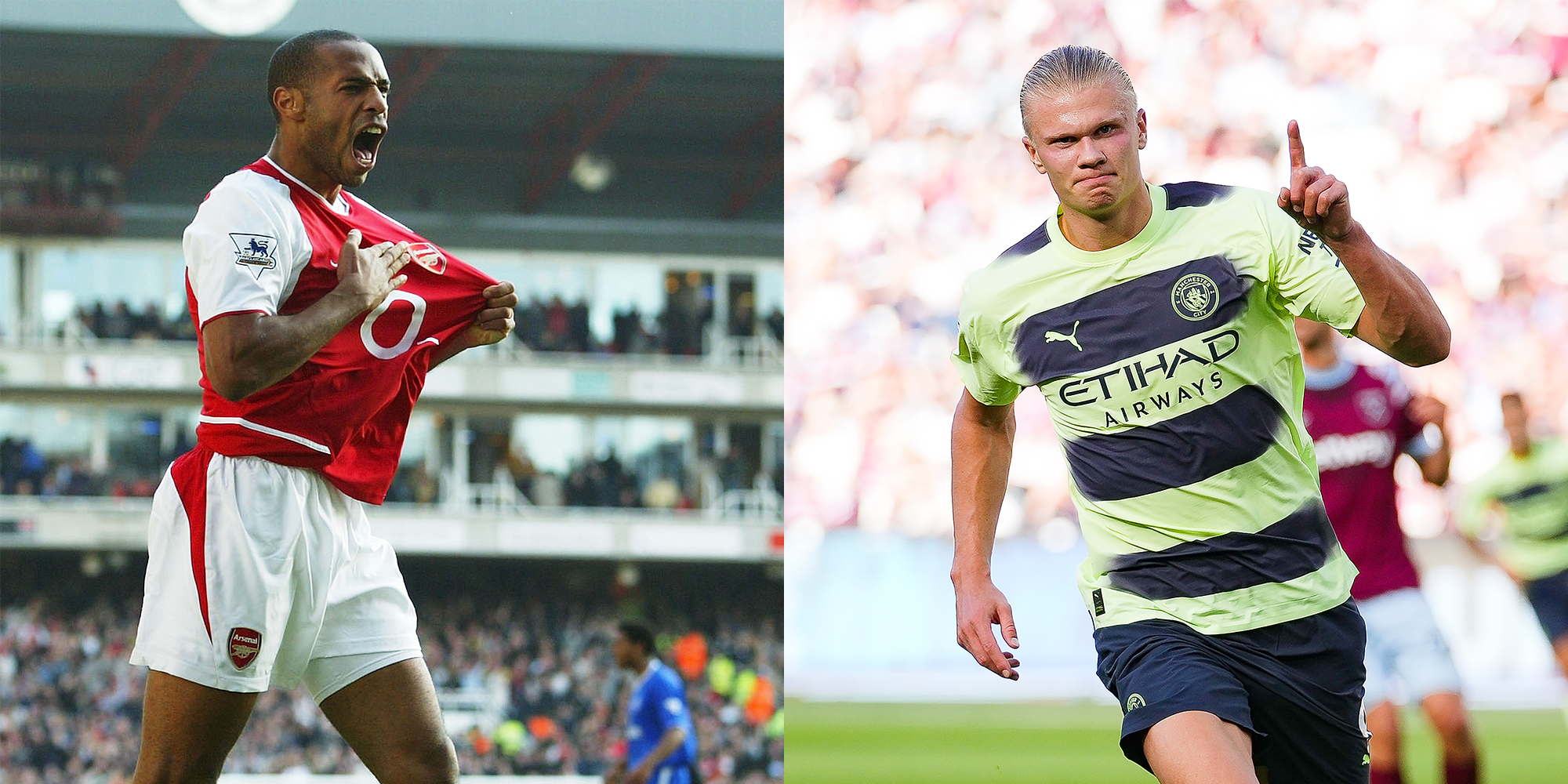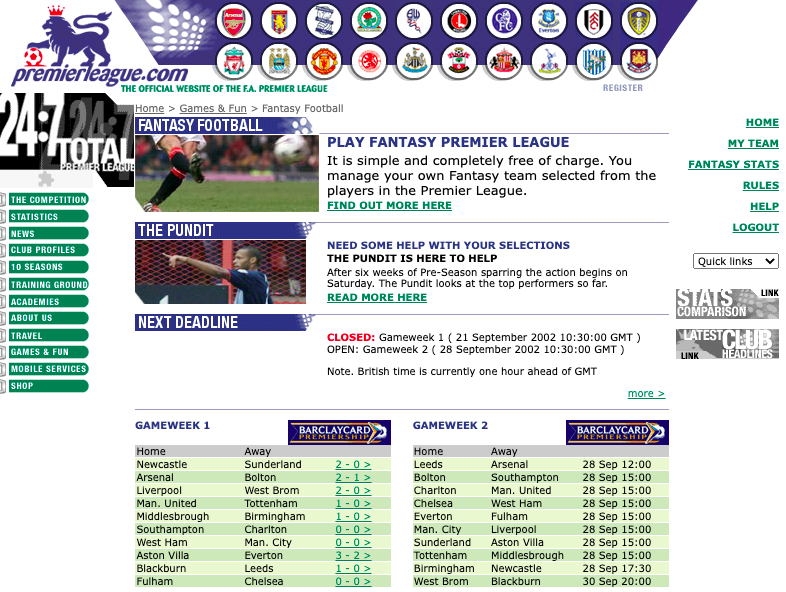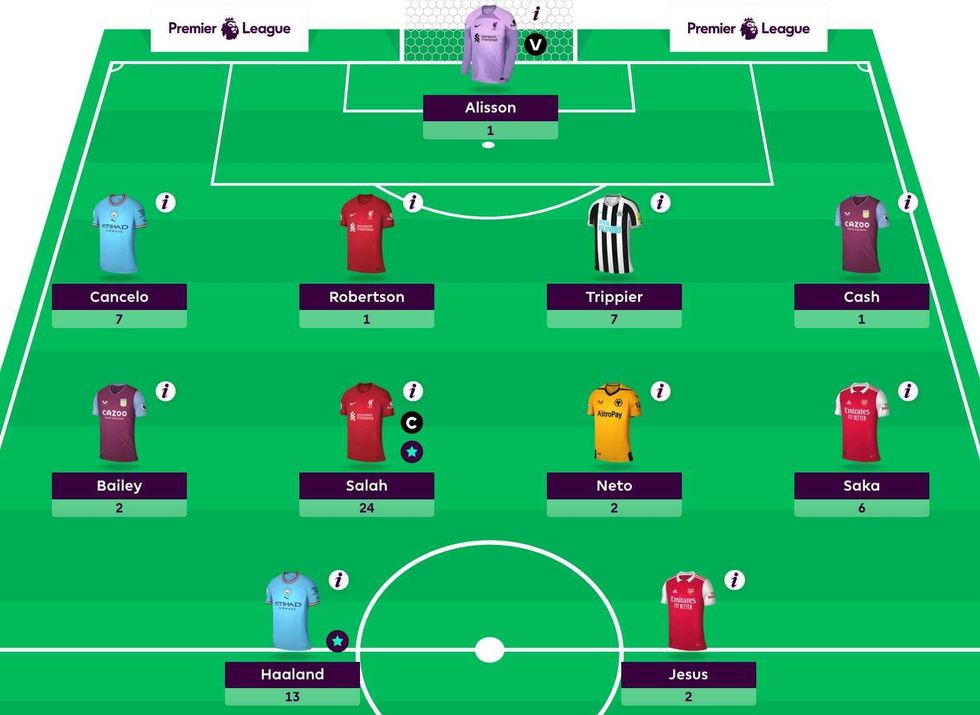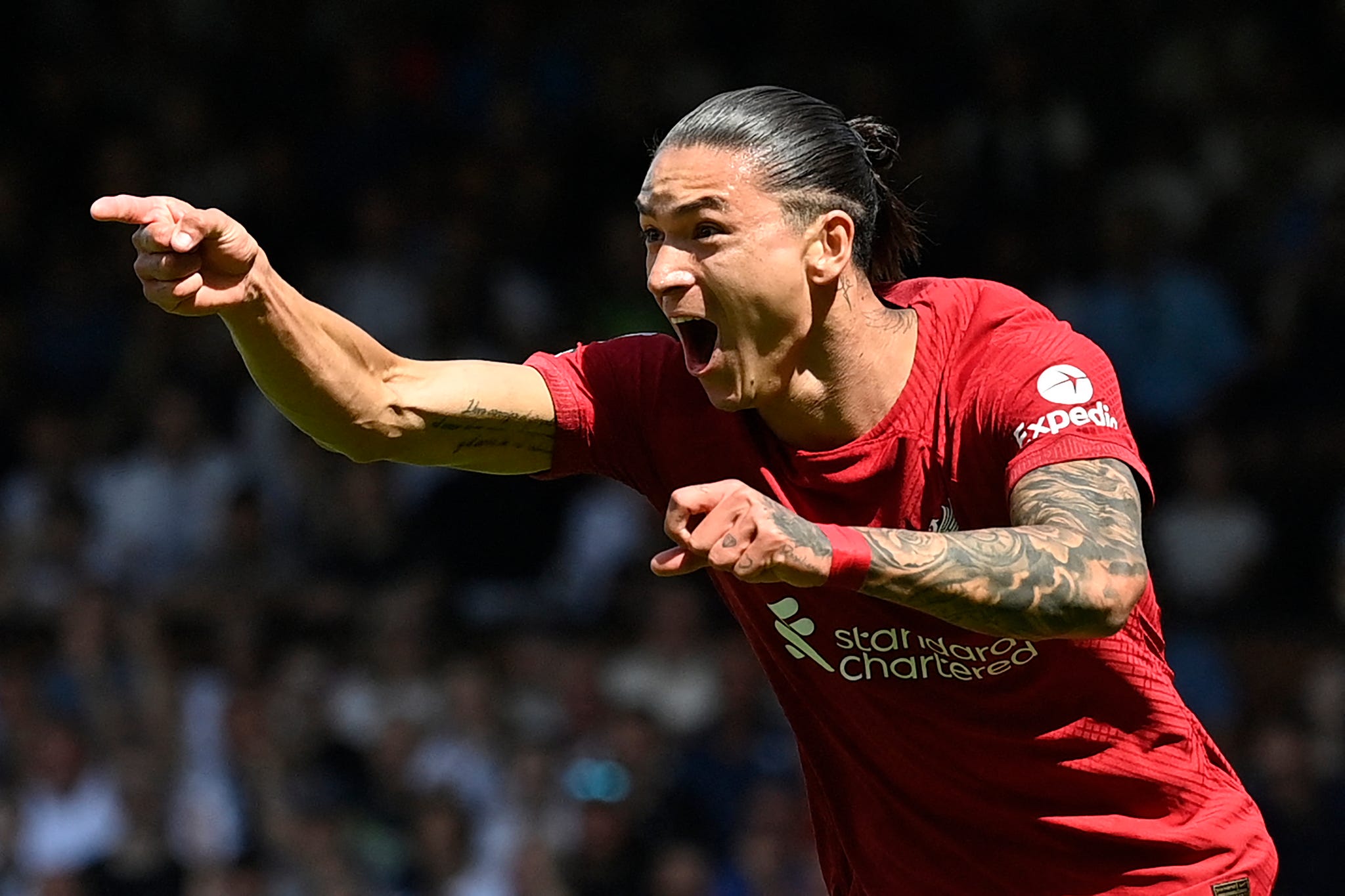Laura Olsson knew exactly what was wrong with her husband.
She’d seen exactly that face before. There was only one thing that made Jonny “really reserved” like that. “He gets grumpy, short-tempered and really off with you,” she says.
For Laura, it was the first night of a skiing holiday in Bulgaria with some friends. For Jonny, it was a nightmare. His Fantasy Premier League score was in, and it wasn’t good news.
Texts came piling through, but one stood out: “I’m so sorry for what you’re about to see.”
Immediately, he checked the scores of the games that had been played while he’d been in the air. That week, he’d triple-captained Manchester City’s Leroy Sané – meaning any points Sané scored were trebled – for a double gameweek while his mates had done the same with Sergio Aguero. City had won 3-1, but Jonny’s hope was short-lived. “I scroll down and see ‘Aguero, Aguero, Aguero’”.
He was “trying to compartmentalise my rage, trying to stay calm, but my wife knows something's wrong”. For the whole holiday, Jonny fumed. Another single-point performance for Sané didn’t help his mood.
Fantasy Premier League (FPL) had been fine while the couple had been at university, but a decade later Laura had had enough. “We did have to have quite a serious chat about, like: come on. It's a game. You can't let it affect your marriage. And the rest of your life.”
And yet, despite the pain, Jonny and millions of others just stepped into the virtual dugout once again. This past weekend marked the first gameweek of the new Fantasy Premier League season, and 20 years since the Premier League launched its official, free to play game.
Fantasy football had already been around for more than a decade, but FPL was an entirely different beast. The Premier League’s game has become a phenomenon, a parallel sporting industry with its own ecosystem of stars, pundits and gurus and command of enough eyes and ears to convince mainstream news outlets from the i to the Daily Mirror to turn out advice pieces and newsletters.
It’s simple. With a budget of £100 million, you put together a squad of 15 players from the Premier League, who earn points for minutes played, goals, assists and clean sheets and lose them for own goals, red cards and yellow cards. Players compete in one gigantic league against everyone else, but also in mini-leagues with friends, strangers, colleagues, teammates, people from the pub, people they went to uni with 15 years ago.
Over 2.5 million players started the season in 2012. A decade later, and FPL has likely crossed the 10 million player threshold for the first time. I’m there for my 15th season, guiding Ayew Being Served? (FKA Dzeko & the Bunnymen, FKA Tor Andre Flo Rida) to mid-table security.
It’s wrapped itself around the experience of watching, quantifying, talking about and feeling about football. Commentators mention points hauls during games. Leeds’ Patrick Bamford was asked how he felt after scoring and registering two assists against Leicester City in January 2021 in a post-match interview. “Do you know what, I flipping took myself off captain,” Bamford said. “So I’m fuming.”
The following month, Aston Villa banned its players from playing FPL, in case their selections gave away inside information to opponents.
FPL is massively popular, overwhelmingly so with men – the Premier League’s figures say 92 percent of players identify as such – and scratches their itch for competition and mockery as bonding.
But beneath the cry-laugh emojis, there’s an emotional tug. The ready-made talking points and regular schedule of games are a conversational crutch for friendships that are still fond and important, but which life – jobs, kids, distance, general sense of apathy – has got in the way of.
“It's not always easiest to just reach out with people and have a bit of a random conversation,” says Josh Maunder, 30, who works in compliance and also lives near Sheffield. “But as soon as you've smashed your friend by getting more points than them, it's good for keeping in touch.”
That’s partly why in June this year, 32-year-old Shaun Seaton, a recruitment manager living outside Sheffield, decided to start FPL Mental Health (@FPL_health) on Twitter. The idea was to use FPL as a lever to get men to talk about their feelings and point them towards resources that can help.
A little over two months later, he says he’s had around 500 messages from men who’ve been struggling to open up. They start talking about FPL, and gradually get into weightier matters. Seaton’s not a medical professional, and has taken some flak for wading in, but he wants to help.
“I just thought I would open up a page with a view to having a safe community where I could interact with people and just kind of help people really using my own beliefs, morals, values,” he says.
The game itself hasn’t changed a great deal in 20 years, aside from the introduction of special ‘chips’ used once a season to make free transfers, add points from players on the bench, or triple a captain’s haul. The way to win the game has changed though.
Abdul Rehman started playing FPL when he was in school, 16 seasons ago. “It was like a cult back then,” he says from his home in Dundee. “I preferred it back then, to be honest.”
Now 35, he has 75,000 followers on Twitter as @FPL_Salah, writes for The Athletic and dedicated FPL site Fantasy Football Hub, and is a regular guest on the Premier League’s official FPL show. Top players these days aren’t Harry Redknapp-style vibe-smiths; they’re hard-nosed number-crunchers.
“Ninety-nine percent of their decisions are stat based, rather than watching the games. And you know, that is the best way to play the game: looking at the cold hard numbers, looking at the stats, xG [expected goals] stats, looking at models, and expected minutes and things like that. And that is the future of the game, as well.”
Holly Shand is one of Rehman’s FPL content colleagues. The 32-year-old lives in Grimsby and used to be a GCSE and A-level maths teacher, but while on maternity leave in 2019 she decided to go full time with the FPL content creation she’d been doing for a couple of years. Now she works three and a half days a week making FPL content for Twitter, YouTube and The Athletic, as well as the official FPL show. Shand is firmly numbers-driven.
“For me, it's definitely the stats and data side and being able to join together a love of football with a love of data, essentially. And the strategy behind it, that involves a lot of logical thinking, which I like doing as well.”
The explosion of FPL on social media has created a kind of open source resource for managers and creators, Shand says.
“There’s so many ideas being shared and so much access to information now, as well, from Opta data. There's a lot of people within the community that are doing great things with the data and giving you a different viewpoint on things.”
Though there’s no cash prize for winning FPL, ‘money leagues’ where players agree to pay into a pot that’s split at the end of the season are common: one 2020 study found a little more than half of players had bet on fantasy football in the previous year. Then there are FPL clones specifically aimed at gamblers, promising huge winnings.
“Because of the kind of advertisement FPL is getting now it's attracting that breed of players as well who are just kind of coming in to make money from it,” says Rehman. In the past few years, he says, professional poker players have started playing in big numbers.
Ben Crellin is one. The 32-year-old, who lives near Hexham in the Tyne Valley, learned about fantasy football on poker forums. To help him plan his season out, he made Excel spreadsheets which pointed out double gameweeks and favourable runs of fixtures.
Other players wanted access to them, and now he has more than 200,000 Twitter followers and enough clients paying for his spreadsheets and advice that he’s gone full time with it. At the start of the season, he's working on it eight hours a day, five days a week. Last season 5,500 people had access to his transfer planning spreadsheet, and he's partnered with Fantasy Football Hub.
“I've never had a proper job,” he says. “I've gone from dropping out of university to playing poker to now doing fantasy football.”
The ability to spot patterns, trust statistics and make cold, rational decisions makes FPL ideal for poker players, Crellin says. “Playing like 20 tables online at the same time, you’ve just got to be a bit robotic. And so when it came to fantasy football, emotions are just so easy to deal with compared to poker.”
The peaks and troughs of a tricky gameweek pale in comparison. “I played four million hands of poker online, and that's real emotion,” says Crellin. “You can get really unlucky in poker, and you have to just learn to handle your emotions.”
It’s just a game. But even with no money riding on it, FPL can play havoc with players’ mental health. A study of more than 2000 fantasy football players by Nottingham Trent University last year found that though it was a minority of users who suffered low moods and anxiety while taking part in fantasy football, it was those who put the most hours into playing, thinking about and researching the game, across several different leagues, that scored highest for low mood, anxiety, functional impairment and problematic behaviour.
It’s not clear that fantasy football caused it, but the players I spoke to – aside from Crellin – all found FPL became a focus for low mood. Matt Vasey has been a moderator on Reddit’s r/FantasyPL board for 11 years, and about three years ago he noticed the game was getting to him.
“I don't know whether that was a combination of being a moderator and taking part or was it just the taking part. But whatever it was – like you had a shit week, and you only got 30 points and everyone else got 72 or something, and you're in second place and the leader has that one guy who had a hat trick or whatever – I just found myself getting really pissed off at the weekends. And just being like, why? Why am I doing this? Like, what the hell's the point?”
Seaton hit a wall of his own after becoming consumed by FPL during the Covid lockdowns. “I really, really struggled to the point where I just quit – just quit the game,” he says. “I lost interest in football. I stopped watching it. Which was a real shame.”
The game’s vast popularity is, in part, fuelling things, he thinks. “One thing we are noticing is there's a lot more YouTube content. There's a lot more active people on Twitter now. And I think there's nothing worse than when you've had a bad week that you see a thousand people having a great week.”
The Premier League has more than you’d think riding on FPL too. The top men’s league is one of the UK’s biggest sources of global soft power, a turbine for wealth and prestige which connects people in Kyoto and Dakar and Denver to Bournemouth and Norwich and Wolverhampton, and it uses FPL as its own stealth ambassador.
Players from the UK and Ireland make up just 36.6 percent of all players; Egypt is the second best-represented country in FPL with 8.64 percent, then Nigeria (4.25 percent) and Malaysia (3.68 percent). The USA, Norway, Kenya, South Africa and India are all in the top 15 FPL-playing countries.
“It’s about engagement,” the Premier League’s head of digital Martin Axford told the i in 2018. “It’s really important that we provide a platform that allows people an entry point to enjoy the Premier League through a fantasy lens. Matches that don’t feature the club they support suddenly take on a new significance because they have players playing for those clubs in their fantasy teams.”
Every player I spoke to said that they watched more football – and, crucially, more football featuring teams they didn’t care about – because one of their FPL team was playing.
“If Newcastle and Burnley were playing on a Sunday, you'd think twice about watching it,” says Rehman. “But if you've got a player playing in that fixture, you've done it and you're pretty much watching every single game. It really tests the limit to your actual loyalties to your actual team you support, to be perfectly honest.”
It’s definitely changed the way he watches football, he says. “I don't like the way it makes me feel in that sense, but I don't know. I'm just too deep into it now.”
Liverpool fan Seaton agrees. “There was a time when when Liverpool used to lose, it used to fuck my entire weekend because you invest yourself that much into it. And I think that's what FPL is slowly creating now. It's giving people an avenue to watch games that they wouldn't care less about 10 years ago.”
It’s not just teams who benefit from more exposure. When a player comes through for your team, you feel a personal gratitude towards them.
“There's no way of knowing, but it makes you feel like, ‘I've done that, I've been a part of that’,” says Vasey. “And he's done that for me as well – like, you've got some kind of relationship or something with these players.”
He knows, though, that every decision is half-chance. “It's a scratch card, is kind of how I see it,” says Vasey. “I can improve my odds. But I can't predict the future. So the little control that I have makes me feel like I have determined the future.”
That basic mystery is the source of FPL’s power, Shand thinks. “There is no cheat code,” she says. “You've got to have the patience for the full season to do well in it and you look at life in general nowadays, which is so fast paced and you're getting information instantly... being able to actually flex a skill by performing well in FPL over a full season, it's not easy, but I think that's the appeal.”
Despite the pain, Jonny Olsson is ready to put on the puffer jacket and command the technical area once again. He feels like late-period Arsene Wenger.
“You know when he clung on at the end at Arsenal, and they were barely scraping fourth, and he was like ‘I'm not gonna leave’ and eventually just got binned off? That's basically me. But there's no one to sack me.”
















